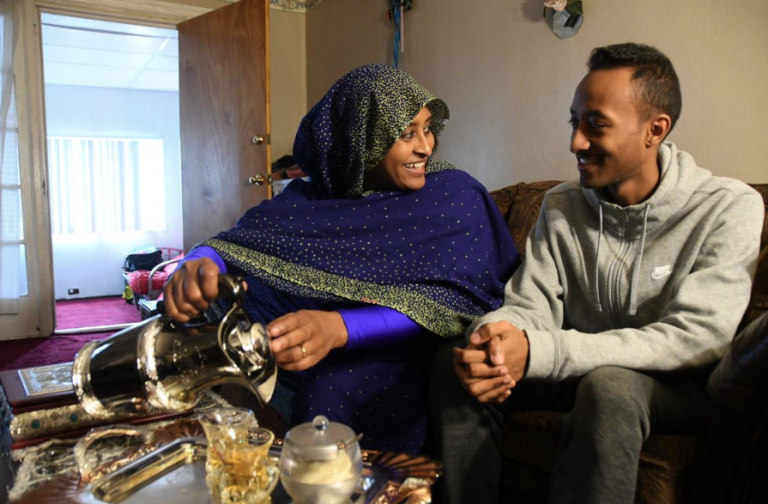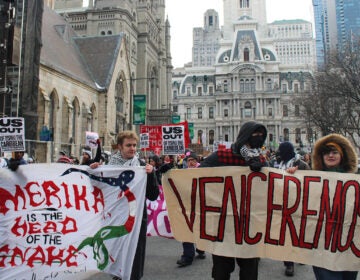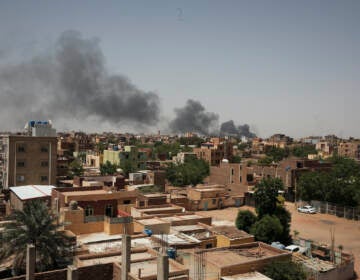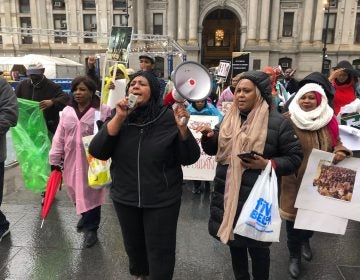Local Sudanese happy to see longtime dictator al-Bashir removed
These sentiments echoed through the approximately 3,000 members of the Sudanese community in greater Philadelphia this weekend.

Sawsan Ali, left, and son Maaz Mohammed celebrate the fall of Sudanese leader Omar Al-Bashir. (Abdul R. Sulayman/The Philadelphia Tribune)
It was just after midnight Thursday and Maaz Mohammed wanted to let his mother sleep.
But the 21-year-old college student knew that the overthrow of dictator Omar al-Bashir in his family’s native Sudan was news Sawsan Ali would want to hear, so he shook her awake.
“I was groggy, but he said, ‘Mom, there is good news about our country,’” said Sawsan Ali, a psychologist and educator living in Southwest Philadelphia. “I was so excited, I did not go back to sleep. We were up watching the news as it came until 4 in the morning.”
These sentiments echoed through the approximately 3,000 members of the Sudanese community in greater Philadelphia this weekend.
Al-Bashir, who has been accused by the International Criminal Court of overseeing a genocide in Darfur, in western Sudan, was removed from his post by the army last week after 30 years in power. His ouster comes after months of peaceful protests, mostly by younger groups who want democracy. Over the weekend, 13 people were killed in armed attack on protesters. However, there has been limited civilian bloodshed.
Al-Bashir ally Ibn Auf replaced him for one day before public outcry forced him out. He since has been replaced by Lt. Gen. Abdel-Fattah Burhan. For now, the plan is for the military to lead the country for the next two years.
Ali, who was born in Sudan, is optimistic that free elections will come sooner.
Ali followed her husband, Fakhereldeen Mohammed, to the U.S. in search of a “better life.” She gave birth to her son here. And in 2002, she earned a master’s degree from Cheyney University.
She did not address the genocide or the wars that al-Bashir has been accused of starting, but she said that freedom of speech is all but banned in Sudan and there is widespread hunger and poverty as a result of al-Bashir’s government.
“The economy has become very difficult and there is too much suffering,” Ali said. “Gradually, Sudan has become poorer and people cannot live a simple life.”
Mohammed goes to Sudan every other year to visit family. On his last visit, he said, he saw firsthand the bread shortage Sudan =
“If you can imagine bread prices skyrocketing, people waiting in line for bread and constantly complaining about the government,” Mohammed said. “But not just bread. There are lines for everything — gasoline, the basics.
“It was surreal,” he continued. “And it is just as surreal now to know that there is a good opportunity for change now.”
Banker Isam Abdelhalim, 48, also living in Southwest Philadelphia, moved from Sudan 18 years ago this month. He, too, said he came to the U.S. to look for a better life than what he had at home.
His brother, Abass Abdelhalim (Alaalim), still in Sudan, had been participating in protests and sit-ins as a member of an al-Bashir opposition group, the Sudan Congress Party, before he was arrested on Jan. 11, 2018.
He was released from prison on April 11, the same day that al-Bashir was taken down in the coup.
“They randomly arrested him and silenced him,” Abdelhalim said, adding that his brother’s computer, phone and all means of communication were confiscated. “He is one of those multimedia guys and they did not want him getting his message out. Now he’s busy and very optimistic about what is going on.”
Over the last few days, Abdelhalim has been referring to what is transpiring in Sudan as a second Independence Day. Sudan declared its independence from Britain on New Year’s Day 1956.
“This is something that can be celebrated around the world, even if the government is slow to take hold,” Abdelhalim said. “People are learning that they can make their voices heard. This is very big — no more dictator.”
WHYY is your source for fact-based, in-depth journalism and information. As a nonprofit organization, we rely on financial support from readers like you. Please give today.




